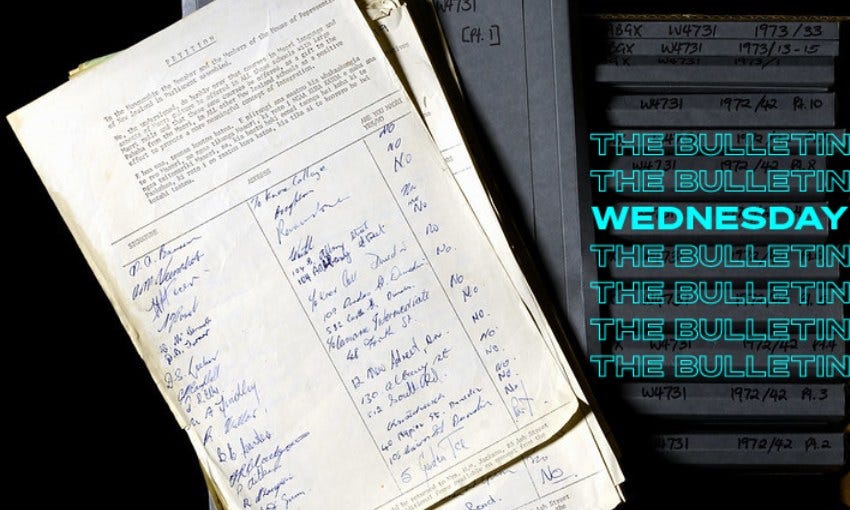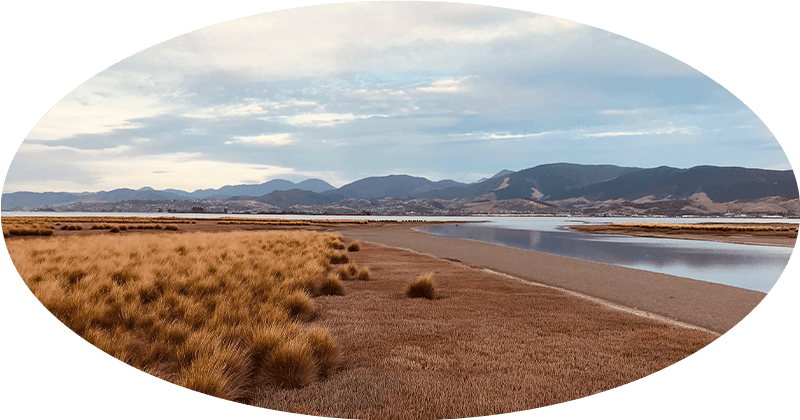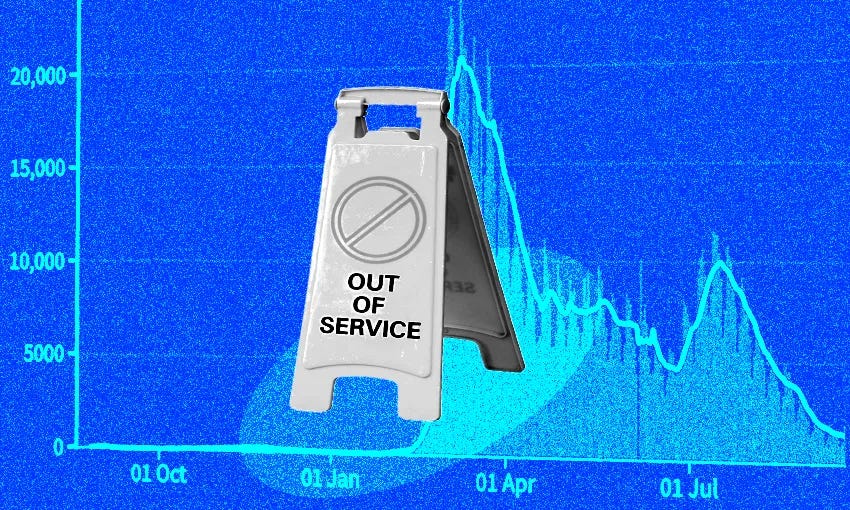The 50th anniversary of a humble prayer
Fifty years ago, a petition was taken to parliament asking that the Māori language be taught in schools. It takes a generation to lose a language and three to restore it, so where are we, 50 years on?
Mōrena and welcome to The Bulletin for Wednesday, September 14, by Anna Rawhiti-Connell. Presented in partnership with Z Energy.
In today’s edition: offer made to mill workers in Kawerau; Christchurch votes no on government's housing intensification rules; the eight billion reasons food prices may stay high; but first, the peitition that kicked off a language revitalisation.
The petition presented to parliament on this day in 1972 (Image: Archives NZ CC BY 2.0)
Former race relations conciliator on “taking political correctness to new extremes”
Not quite 20 years ago, then race relations conciliator, Joris de Bres unwittingly kicked off a media storm by suggesting it would be good for business, good for the language and good for the image of the country if more companies used te reo Māori. This morning on The Spinoff he reflects on that time, recalling the Dominion Post running a cartoon of a McDonald’s sign changed to “McMāori” with a customer being asked “Do you want fries with your hāngi?” de Bres still stands by his point of view but notes that it should now reflect a genuine commitment to reo and tikanga and avoid tokenism and cultural expropriation. If you look at some of the responses to the release of Whittaker’s miraka kīrimi last month where one commenter likened it to “forced mandated injections”, you might wonder how far we’ve come.
“Don't turn around with your bum”
Today marks the 50th anniversary of a petition being presented to parliament to ask that Māori be taught in schools. In 1970, only 5% of Māori children could speak te reo Māori. Today, 30% of New Zealanders can speak some reo Māori, with a quarter of Māori now able to speak it as a first language. Māori language adviser, translator and author Hēmi Kelly thinks we’re halfway to becoming a bilingual country. Rawiri Paratene was a member of the group Ngā Tamatoa, who worked to collect signatures for the petition. Paratene was there when the petition was presented. This morning he reflects on that moment, his aunty's advice for it (“don't turn around with your bum”) and on living in a suburb where Robert Muldoon was once MP and where people greet him each morning in reo Māori.
We the undersigned…
The 1972 petition read: “We the undersigned, do humbly pray that courses in Māori language and aspects of Māori culture be offered in all those schools with large Māori rolls and that these same courses be offered, as a gift to the Pākeha from the Māori, in all other New Zealand schools as a positive effort to promote a more meaningful concept of integration.” Integration and assimilation were terms used in the Hunn Report of 1960 where assimilation meant that Māori would “become absorbed, blended, amalgamated, with complete loss of Māori culture”. The petition, signed by 30,000 people, was one of the steps taken to stop that from happening at a crucial juncture. RNZ’s Jamie Tahana has an excellent read on the people behind the petition.
Beyond the humble prayer
I know we see things most days that suggest there is still a basic fight going on for reo Māori to just exist in everyday settings. But it sits alongside plenty of rigorous discussion led by Māori. Should Lorde should be using it? Should Pākeha learn it at the expense of Māori? How should non-Māori do pepeha? I’d like to think we have advanced well past that humble prayer, while acknowledging that was the start of work which Māori language commissioner Rawinia Higgins says is not yet finished. Where we can people can talk about the loss of their language and their reclamation of it, as Siena Yates has done in a series of columns for E-Tangata, and be OK about it.
A national commemorative event will be held at parliament today to mark the 50th anniversary of the petition from 11:30am - 1pm and will be live-streamed on Whaakata Māori. Details of the commemoration are here.
Wetlands are changing how we can offset our carbon
For many companies, forest carbon offsets have become a way to give back to the environment for the use of its resources. But the establishment of wetlands to do the same, known as blue carbon offsetting, may be the even greener offsetting option. With help from Z Energy, The Nature Conservancy are replenishing potential blue carbon sites around Aotearoa with an aim to turn them into carbon offset areas. To read more about this work, read the full piece on The Spinoff now, and learn about blue carbon initiatives at The Nature Conservancy, here (sponsored).
Offer made to mill workers in Kawerau
After more than a month of a lockout, the employers of workers at the Essity mill in Kawerau have made workers a pay offer. The Employment Relations Authority (ERA) has recommended pay increases that Essity has accepted. Essity, one of the world's largest hygiene and health companies, has also withdrawn all legal claims against the workers. The offer has been put to the Pulp and Paper Workers' Union in line with those recommendations. Union members will consider the offer today. Essity had previously said it was offering rises of 3% per year plus a one-off cash payment. The ERA has recommended a 5% pay increase and a $4000 lump sum payment for this year, with ongoing increases and lump sum payments over 2023 and 2024.
“I want to vote to give the proverbial finger to the government.”
That’s Christchurch city councillor Melanie Coker giving the proverbial finger to the government's housing intensification rules. Coker and nine other councillors voted against notifying the government’s plans to allow up to three, three-storey homes on most sections across the city yesterday. Christchurch city council has broken away from general consensus across 12 out of 14 councils (albeit with caveats in Auckland’s case) in deciding not to enforce the rules. One of the councillors who voted no is the current frontrunner for mayor, Phil Mauger. This creates something of a showdown situation with the government and the likelihood of a commissioner being appointed to force through the changes.
September is birthday month for The Spinoff. We’ve come a long way since 2014 and that is in no small part thanks to our members.
Their generous support underpins all our work and has meant we are able to cover more areas of life in Aotearoa, to tackle more stories about our people and issues impacting our communities. From our ongoing coverage of inequality and the cost-of-living crisis, to political reporting and our focus on te ao Māori, it’s important mahi and we can’t do it without you.
Let’s keep a good thing going - tautoko mai, donate today.
The eight billion reasons food prices have shot up so quickly
Here’s a good outline (paywalled) from the Herald’s John Weekes about why food prices rose at the fastest rate in 13 years last month. Now that I’ve sold it as a good read, and there are some short term factors that may resolve themselves or we’ll blame the government for that not happening, there are also some long term ones which have a far greater influence and are fairly grim. ANZ’s Sharon Zollner points to the war in Ukraine driving grain prices higher, which lines up with an equally grim briefing from Treasury last week (paywalled) on the long term consequences of the war. Zollner also mentions extreme weather, labour shortages and fuel costs. Perhaps the most confronting of all was the issue of global population which will hit eight billion soon. "The world is going to face challenges feeding itself," Zollner said.
Click and collect
Alan Hall would like the government to "get a bloody hurry on" with the independent review into his innocence.
Government to change firearms law again.
Why Rod Drury is backing a candidate in the Queenstown Lakes District mayoral race.
Philip Arps fails in bid to be elected to school board in Christchurch gaining 2.6% of the vote.
New Zealand and Australia working together to get Pacific leaders to Queen’s funeral.
Got some feedback about The Bulletin, or anything in the news? Get in touch with me at thebulletin@thespinoff.co.nz.
If you liked what you read today, share The Bulletin with friends, family and colleagues.
Madeleine Chapman farewells The Spinoff's daily Covid Tracker graph as the Ministry of Health moves to weekly reporting of the numbers. Nicole Titihuia Hawkins shares a list of pukapuka that have helped her along her te reo learning journey. Sam Brooks talks to musical and cabaret star Rutene Spooner about his new show Thoroughly Modern Māui. And for Stocktake, Chris Schulz picks All Good co-founder Simon Coley's brain for his five most valuable business lessons.
Squad named for Rugby World Cup
The Rugby World Cup is now only 24 days away. The squad for the tournament, which is being hosted here for the first time, was announced yesterday. Sevens stars Portia Woodman, Sarah Hirini and Stacey Fluhler are among the 32-strong squad which is co-captained by Kennedy Simon and Ruahei Demant. In case you were wondering why the world cup matches are only being played in Auckland and Whangārei, LockerRoom contributor Jim Kayes explains that it’s about bang for buck. In other news, New Zealand Rugby left $280,000 of funding from Sport New Zealand on the table by failing to have women make up 40% of its board by December 2021. Sport New Zealand advised of this requirement in 2018.











